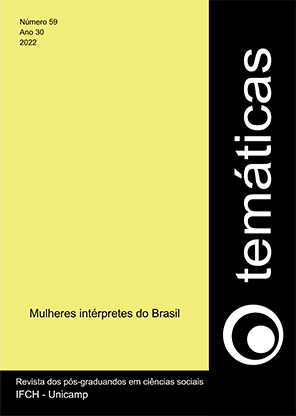Abstract
The most recent socio-historical period has lead to, by the force of action and the protagonism of some groups, the debate about difference and the social inequalities which routinely have been structured from it. The same movement required the intellectual field to think critically about itself, ponder about the place of difference and of the reiterated inequalities which were naturalized internally. Therefore, if the power arrangements that organize social life from the normalization of thought forms, such as patriarchalism and racism, were uncritically fluid for a long time in the organization of the intellectual arena, in both cases these organized arrangements also were not free of disputes and tensions. In the intellectual milieu raises the need to think about the difference in the space of academic production, pari e passu to the confrontation promoted by black and feminist groups. While the vast majority of the books that are of the inventory with the "great works" of national interpretation, the "great essays" that elucidate Brazil, list almost exclusively male figures, we must ask: where were the Brazilian female intellectuals? What were they concerned about? Did they not produce "national interpretations" or does this absence in the known cast of interpreters of Brazil express an erasure or a subplacement attributed to their productions and their ways of explaining the world? After all, what are the places and possibilities for us to reach the national interpretation produced by women? This interview with the professor Mariana Miggiolaro Chaguri (IFCH/UNICAMP) walks through such problematizations.
References
CONNELL, Raewyn. Why is classical theory classical? American Journal of Sociology, v. 102, n. 6, p. 1511-1557, 1997.
HARDING, Sandra. A instabilidade das categorias analíticas na teoria feminista. Estudos Feministas, n.1, p. 7-31, 1993. Disponível em: http://www.legh.cfh.ufsc.br/files/2015/08/sandra-harding.pdf. Acesso em: 30 ago. 2021.
MORETTI, Franco. The slaughterhouse of literature. MLQ: Modern Language Quarterly, v. 61, n. 1, p. 207-227, 2000.
PIRES, Bárbara Luísa Fernandes. O tecido das contradições e a trama das equivalências: gênero, arte e sociedade no ensaísmo de Gilda de Mello e Souza. Dissertação (mestrado) - Instituto de Filosofia e Ciências Humanas, Universidade Estadual de Campinas, Campinas/SP, 2019. Disponível em: http://bdtd.ibict.br/vufind/Record/CAMP_173dd1fc76b85b920531a70633287c92. Acesso em: 16 fev. 2022.
TRESOLDI, Maria Caroline Marmerolli. Crítica cultural como “esporte de combate”: notas sobre o ensaísmo de Roberto Schwarz e de Beatriz Sarlo. Dissertação (mestrado) - Instituto de Filosofia e Ciências Humanas, Universidade Estadual de Campinas, Campinas/SP, 2019. Disponível em: http://repositorio.unicamp.br/acervo/detalhe/1090289?guid=1645643316739&returnUrl=%2fresultado%2flistar%3fguid%3d1645643316739%26quantidadePaginas%3d1%26codigoRegistro%3d1090289%231090289&i=1. Acesso em: 16 fev. 2022.

This work is licensed under a Creative Commons Attribution-NonCommercial-ShareAlike 4.0 International License.
Copyright (c) 2022 Arilda Arboleya, Camila Carolina Hildebrand Galetti, Caroline Aparecida Guebert, Emilly Gabriela Menezes Franco, Hilton Costa


